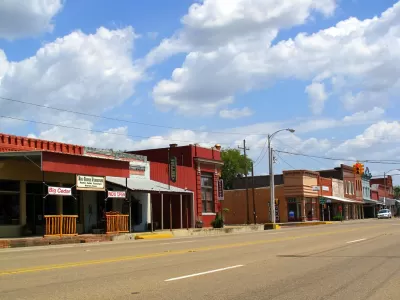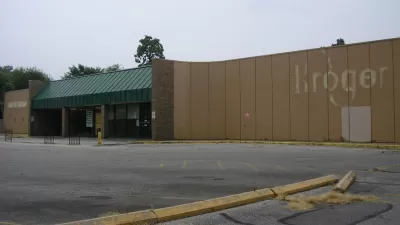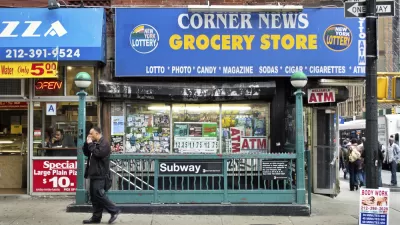When a town doesn’t have a grocery store, it means people don’t have access to food. But grocery stores also play an essential social and economic role in rural places. Community stores are trying to fill in the void.

Jack Healy writes about the growing problem of food deserts in small towns across the country as grocery stores shut down and dollar stores proliferate. "The loss of grocery stores can feel like a cruel joke when you live surrounded by farmland. About 5 million people in rural areas have to travel 10 miles or more to buy groceries, according to the Department of Agriculture."
Some communities are responding by starting up what are referred to as "community stores," essentially co-ops that are stocked with staples but also sell locally produced products. A few states offer financial assistance, such as tax credits and loans, for small-town markets in food deserts. "But mostly, the people setting up crowd-funding sites to buy vegetable coolers and negotiating wholesale rates with huge grocery chains say they are stumbling around with little assistance and no map," says Healy.
In additional to the financial challenges, organizers say getting these operations off the ground is not easy. For one, they have to convince residents to stop shopping at Walmart and dollar stores, and they have to find wholesalers who will provide them the stock they need. But, they say, grocery stores are key to keeping these towns alive. "Their exodus has left rural towns worried about how they can hold on to families, businesses and their future if there is nowhere to buy even a banana," notes Healy.
FULL STORY: Farm Country Feeds America. But Just Try Buying Groceries There.

Alabama: Trump Terminates Settlements for Black Communities Harmed By Raw Sewage
Trump deemed the landmark civil rights agreement “illegal DEI and environmental justice policy.”

Planetizen Federal Action Tracker
A weekly monitor of how Trump’s orders and actions are impacting planners and planning in America.

How Atlanta Built 7,000 Housing Units in 3 Years
The city’s comprehensive, neighborhood-focused housing strategy focuses on identifying properties and land that can be repurposed for housing and encouraging development in underserved neighborhoods.

In Both Crashes and Crime, Public Transportation is Far Safer than Driving
Contrary to popular assumptions, public transportation has far lower crash and crime rates than automobile travel. For safer communities, improve and encourage transit travel.

Report: Zoning Reforms Should Complement Nashville’s Ambitious Transit Plan
Without reform, restrictive zoning codes will limit the impact of the city’s planned transit expansion and could exclude some of the residents who depend on transit the most.

Judge Orders Release of Frozen IRA, IIJA Funding
The decision is a victory for environmental groups who charged that freezing funds for critical infrastructure and disaster response programs caused “real and irreparable harm” to communities.
Urban Design for Planners 1: Software Tools
This six-course series explores essential urban design concepts using open source software and equips planners with the tools they need to participate fully in the urban design process.
Planning for Universal Design
Learn the tools for implementing Universal Design in planning regulations.
Caltrans
Smith Gee Studio
Institute for Housing and Urban Development Studies (IHS)
City of Grandview
Harvard GSD Executive Education
Toledo-Lucas County Plan Commissions
Salt Lake City
NYU Wagner Graduate School of Public Service





























